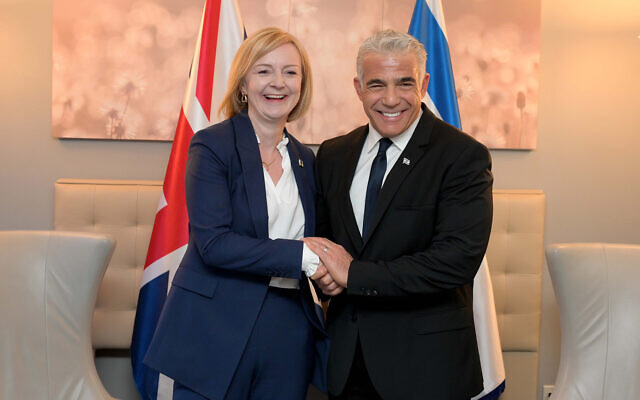Palestinian Authority Prime Minister Mohammad Shtayyeh on Monday voiced concern about UK Prime Minister Liz Truss’s comments suggesting that she is considering moving her country’s embassy from Tel Aviv to Jerusalem.
Speaking ahead of the weekly cabinet meeting in Ramallah, Shtayyeh warned that any embassy move would only “encourage” the “occupying power,” and “undermine” the potential for a two-state solution, according to a statement carried by the PA’s official Wafa news agency.
Conservative Party officials have indicated on multiple occasions that they would consider moving the embassy to Jerusalem, most recently at the Conservative Friends of Israel conference in Birmingham on Sunday.
Shtayyeh added that moving the embassy would violate international law and cited Britain’s role in Israel’s eventual establishment through the Balfour Declaration, which Shtayyeh charged is still responsible for the Palestinians’ plight.
The Balfour Declaration, issued in 1917 by the then-foreign secretary Arthur James Balfour, expressed British support for “a national home for the Jewish people” and is seen as a precursor to Israel’s creation in 1948.
Get The Times of Israel's Daily Edition by email and never miss our top stories
The declaration is viewed by Israelis as one of the most consequential events of the Jewish state’s establishment. Many Palestinians share that view, though with far less positivity.

British Prime Minister Liz Truss arrives for the main speeches on the second day of the annual Conservative Party Conference in Birmingham, central England, on October 3, 2022. (Paul Ellis/AFP)
Last week, the Guardian reported that the ambassadors of all Arab states sent a joint letter to Truss warning against moving the British embassy in Israel from Tel Aviv to Jerusalem.
The letter was sent in September, just before Truss traveled to New York, where she spoke before the United Nations General Assembly and also met with Israeli Prime Minister Yair Lapid, whom she informed that her office would be engaging in a review of the embassy’s current location.
Signatories of the letter included the United Arab Emirates and Bahrain, who signed the Abraham Accords with Israel in 2020, along with Morocco, which normalized ties with Israel shortly thereafter.

Prime Minister Yair Lapid, right, meets with UK Prime Minister Liz Truss, left, in New York City, September 21, 2022. (Avi Ohayon/GPO)
Similar objections have been raised by the UK’s European allies, according to the report.
Israel views Jerusalem as its undivided capital, while most of the international community does not recognize it as such and deems the final borders of the city as dependent on peace talks between Israel and the Palestinians.
Only the US, Guatemala, Kosovo and Honduras have opened embassies in Jerusalem. Other countries, including Hungary, the Czech Republic, Serbia, and Australia, have official trade or defense branches in Jerusalem.
In his remarks Monday, Shtayyeh also decried cited the recent increase in violent incidents in the West Bank — which have included clashes between Israeli security forces and Palestinian gunmen and attacks targeting Israeli civilians. He accused Israel of violating Palestinian human rights and urged the international community to pressure against Israel.
“Any progress in relations between the European Union and the occupying country, without linking it to international law and human rights, would be an undeserved reward, and would encourage Israel to persist in its oppressive and racist policies, and human rights violations,” Shtayyeh added, apparently referring to a meeting between Israeli and EU officials on Monday.
Times of Israel staff and agencies contributed to this report.


